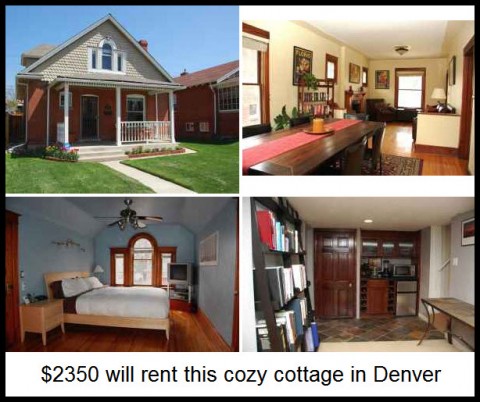Vacancy rates here in Denver are as low as they’ve been in more than a decade, pushing rents sharply higher even as the housing market continues to slump. This reportedly is happening all over the nation as tightened mortgage-lending rules move home ownership beyond the reach of millions of would-be buyers. Many of today’s renters could probably have qualified for mortgages under the loose standards that obtained just a few years ago. These days, however, even if they could get their hands on the money, a growing number of would-be homeowners are passing up the American dream in order to avoid the hassles and expense that come with it. So many are doing this, in fact, that they’ve even sparked bidding wars for rental units in Colorado and elsewhere.
 We heard about this from the bank president of a local branch, a 27-year-old who owns eight rental properties and first became a homeowner himself when he was 19. He said that demand for rentals is so strong these days that he no longer even has to advertise properties to get them leased quickly; word of mouth is all that’s needed. Run a rental ad on Craig’s list, he says, and in just a day or two you’re swamped with applications. And in numerous instance where apartment-hunters have shown up, only to learn that a unit had already been rented, they’ve offered to pay more for it — much more. Just recently, the banker said, a guy offered to pay $1450 a month for an apartment that had just been rented for $1300. Some are willing to sign extended leases for two, three or even five years, the banker said, but with demand so strong, there’s little incentive for landlords to accommodate.
We heard about this from the bank president of a local branch, a 27-year-old who owns eight rental properties and first became a homeowner himself when he was 19. He said that demand for rentals is so strong these days that he no longer even has to advertise properties to get them leased quickly; word of mouth is all that’s needed. Run a rental ad on Craig’s list, he says, and in just a day or two you’re swamped with applications. And in numerous instance where apartment-hunters have shown up, only to learn that a unit had already been rented, they’ve offered to pay more for it — much more. Just recently, the banker said, a guy offered to pay $1450 a month for an apartment that had just been rented for $1300. Some are willing to sign extended leases for two, three or even five years, the banker said, but with demand so strong, there’s little incentive for landlords to accommodate.
“Honey, Let’s Sell the House…”
Who’s doing the renting? All kinds of people, apparently. Many are waiting for real estate prices to bottom, the banker told us. Others have walked away from homes in foreclosure, making them less-than-ideal tenants in the eyes of landlords. About 60 percent of them would rent rather than buy no matter what, the banker told us. “Most of them say they just don’t want to deal with the trouble and expense of owning a home.” Of course, one of those “expenses” is the hit that homeowners take when their properties fall in value. Prices have dropped by nearly a third across the U.S. since peaking in 2006, and the trend seems likely to continue. (For the record, Rick’s Picks has long predicted that residential real estate values would eventually fall by at least 70 percent — and even more in the vacation-home market.) Under the circumstances, it seems likely that landlords will enjoy a seller’s market for the foreseeable future. We’d rent a home ourselves but for one small problem: a spouse who would be most unhappy if we were to say, “Honey, let’s sell the house and rent a palace, since it will ultimately be cheaper.” Alas, what makes perfect economic sense can sometimes sound like a perfectly bad idea.
***
(If you’d like to have Rick’s Picks commentary delivered free each day to your e-mail box, click here.)

Rick apparently knows that “the key to a happy life is a happy wife.” As the ad says, “Priceless.”